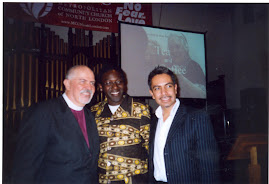Press Release:
AIDS Implementers Must Address Human Rights
OSIEA and LAHI 28 May 2008****************
KAMPALA — The upcoming HIV/AIDS Implementers’ Meeting in Uganda mustaddress the widespread human rights abuses and lack of legal servicesfueling the country’s HIV epidemic, according to a new report releasedtoday by the Open Society Initiative for East Africa (OSIEA) and OSI’s Lawand Health Initiative (LAHI).“As a global leader in HIV prevention and treatment, Uganda must set abetter example on HIV and human rights,” said Binaifer Nowrojee, OSIEAdirector. “Uganda cannot effectively respond to the AIDS crisis withoutprotecting the rights of the most marginalized members of society.”The report, HIV/AIDS, Human Rights, and Legal Services in Uganda, documentscommon abuses faced by people living with AIDS or at high risk of HIV,including: barriers to employment or education; discrimination in gainingaccess to medical care; violations of the right to medical privacy; forcedHIV testing; and eviction from housing.
According to the report, while the government of Uganda has addressed themedical effects of the HIV epidemic, it has paid little attention to theepidemic’s legal and human rights implications. This is especially true formarginalized populations who are most vulnerable to HIV-related humanrights abuses: women (especially young women, widows, and women living infishing communities); sex workers; orphans and vulnerable children;lesbian, gay, bisexual, and transgender (LGBT) individuals; and internallydisplaced persons.Uganda has a detailed legal and policy framework to address the humanrights aspects of its HIV epidemic, according to the report.
Yet most people who endure abuses or rights violations do not seek justice or legalredress. One main impediment is that legal services in Uganda are ofteninaccessible, ineffective, disproportionately accessible, or non-existent.In the absence of a national legal aid system in Uganda, the provision ofHIV-related legal services is dominated by non-governmental organizationsthat often lack sufficient funding to meet the need for services.“HIV may not discriminate, but society does,” said Anne Gathumbi, a programofficer for OSIEA and LAHI.
“Ending stigma is a long battle, but it is onethat Uganda needs to engage to protect the human rights and dignity of allof its citizens.”For people living with HIV in Uganda, stigmatization and discriminationrepresent a major obstacle to effective HIV prevention, treatment, care,and support. Fear of discrimination at work and school often prevent peoplefrom seeking treatment for AIDS or from acknowledging their HIV statuspublicly.Girls and women who have survived rape, sexual violence and abduction areexposed to HIV and face the added abuse of being stigmatized by theircommunities. Widows and orphans who have lost husbands or fathers to AIDSare also in greater need of legal aid services. Widows are often blamed forbringing HIV into the family and are cast out from their homes.
Orphaned children may be forced into child labor, which increases HIV vulnerabilityespecially among girls.The criminalization of sex work and LGBT relations in Uganda furtherthwarts HIV prevention and treatment efforts, according to the report.Women who are perceived to be lesbian are sometimes subjected to rape in aneffort to “make them straight.” Similarly sex workers report beingsubjected to violence at the hands of pimps, forced to participate inunsafe sex, robbed of their personal belongings, and coerced by police toperform sexual favors or pay bribes to avoid arrest.The report recommends stronger enforcement of policies and legislation thatoffer clear protection against HIV-related stigma and discrimination. Itcalls for greater support to community-based groups that have sought tointegrate legal support into HIV prevention and care programs. It alsorecommends strengthening legal mechanisms to help people living with HIVaccess justice. Local Council Courts appear to be the most utilized disputeresolution mechanism by communities, but these courts are not being used toaddress HIV-related infringement of rights.
“Addressing HIV solely with a medical response is not enough to combat thedevastating effects of the epidemic in Uganda,” said Jonathan Cohen,director of OSI’s Law and Health Initiative. “As communities in Uganda havelong known, legal support must be present in the AIDS response alongsideprevention and treatment efforts.”The report will be available online at:www.soros.org/initiatives/health/focus/lawTo interview one of the report’s co-authors, please contact: Anne Gathumbiat +254 (0)720 426815 or agathumbi@osiea.org.
Subscribe to:
Post Comments (Atom)




No comments:
Post a Comment